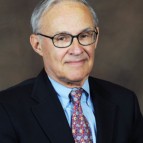
Leon R. Kass, M.D., is the Madden-Jewett Scholar at AEI, Harding Professor Emeritus in the Committee on Social Thought at the University of Chicago, and coeditor of What So Proudly We Hail: The American Soul in Story, Speech, and Song (Intercollegiate Studies Institute, 2011). Originally trained in medicine and biochemistry, he shifted directions from doing science to thinking about its human meaning, and he has been engaged for forty years with ethical and philosophical issues raised by biomedical advancements, and, more recently, with broader moral and cultural issues. Dr. Kass taught at St. John’s College (Annapolis) and Georgetown University before returning in 1976 to the University of Chicago, where he was until 2010 an award-winning teacher deeply involved in undergraduate education and committed to the study of classic texts. With his wife, Amy A. Kass, he helped found a still-popular core humanities course on Human Being and Citizen and a degree-granting major, Fundamentals: Issues and Texts, emphasizing big questions and great books.
